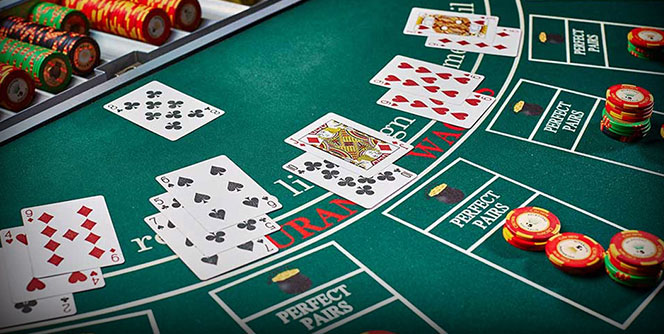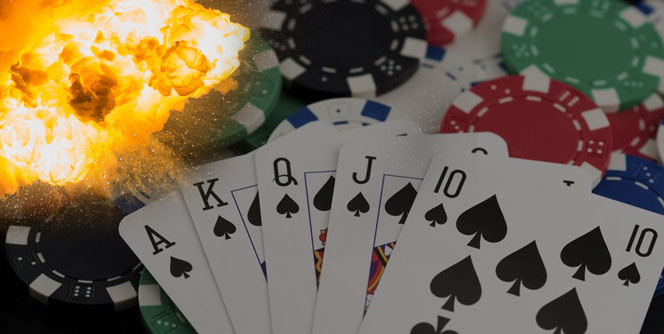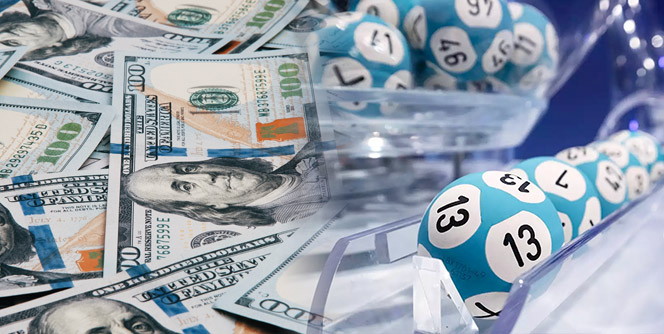The old adage that the house always wins is true in about 99% of the cases. There is no way for an ordinary person to go into the casino and
beat them in their own game. Unless you figure out the way to cheat and get away with it, that is.
Casino cheats appeared very soon after first casinos had opened their doors for business. With huge heaps of cash ripe for the taking, they represented an excellent target for people with ideas.
After all, due to the nature of the gambling business, there are many ins available for those keen to find the way to bend the rules and make the cash flow into their pockets.
Unlike some other criminal activities, cheating the casinos is usually seen as not as bad, at least by the general public. After all, these huge money-making machines are “cheating” us in a way (not really, but you can definitely make a case for an argument there).
For this reason, some of the casino cheats have become legends of sorts, often praised for their ability to beat the house in its own game, on its own turf.
These are some of the most unbelievable and intriguing stories of successful (and less successful) casino cheats, mechanics, and people who managed to find a loophole in the system and took advantage of it.
The First Man to Beat Roulette Wheel
Finding a successful system to beat the roulette wheel has been the dream and obsession of countless gamblers through the decades. There are countless systems out there, all explaining how you can shift roulette odds in your favor and beat the house. Not surprisingly, none of them work, with no exception.
However, during the early 1990s, one man by the name Gonzalo Garcia-Pelayo came up with an idea that actually worked, earning him a couple million in the process.
A passionate gambler with an eye for the detail, Gonzalo realized during his time spent in different casinos across Madrid, Spain, that certain numbers on roulette wheel were coming more often than they theoretically should.
This triggered his imagination and he set on a quest to determine why.
He spent next few months inside the Casino Gran, carefully observing the roulette wheel, determined to figure out its behavior. Gonzalo knew that if he could solve this mystery and figure out what numbers were appearing more frequently, there was a lot of money to be made for his efforts.
He recorded the results of over 1,000 spins and then used computer software to analyze the numbers.
His experiment proved a success, as he was able to figure out the bias on that particular wheel. Gonzalo then had his son and daughter record data for other casinos across Madrid, getting ready to attack.
The trio started playing in 1991 and over the course of two years, they accumulated in excess of $700,000 in winnings. This led to many casinos in Spain banning the family and one casino even tried to sue them. The Supreme Court however ruled in Gonzalo’s favor as they didn’t find his strategy in violation of any laws.
Despite the verdict, Gonzalo decided playing in Spain was no longer viable. So, they moved to Las Vegas to continue their adventure there. Using the same exact strategy, they were able to win more than $2,000,000 in the States, before finally calling it quits.
In 2003, Gonzalo published a book talking about his global roulette assault and his story served as an inspiration for a History Channel documentary.
In the end, Gonzalo wasn’t a cheater in a traditional sense of the word. He simply found a way to use the inherent imperfections of a roulette wheel to his advantage. He never physically interfered with the ball or the wheel and never used any devices inside the casino, which is why he never faced any criminal charges and he got to keep all of his winnings.
The Slot Invasion: Monkey Paw & Light Wand
While the roulette-beating Spaniard may have been very cautious and calculated in his efforts, one Tommy Glen Carmichael was much more straightforward in his attempts to rid casinos of their gains. Carmichael’s cheating career started in the early 1980s, when he came across a simple and crude device that could be used to get coins from the inside of a slot machine.
His first attempts at cheating didn’t go over too well as he was soon arrested and convicted to five years in prison – a rather harsh sentence for a fairly small amount of money he was able to get using a top-bottom joint.
Some people would change their ways after serving five years inside, but not Carmichael. He saw an opportunity and he spent his every waking moment thinking about how to take advantage of it.
After being released, he set his mind on inventing a new cheating device, the one that could be used to attack new slot machines since the technology had changed a lot over the five-year span. So, he first came up with the fabled Monkey Paw, a device that was able to trigger a slot’s micro switch and force the machine into a payout mode.
Monkey paw wouldn’t last long, though, as new changes in technology made it obsolete. Carmichael wasn’t discouraged, though, as he continued his career as an “inventor,” devising the Light Wand. This device would shine bright light onto a slot sensor, blinding it and tricking the machine into spilling coins.
Light Wand was hugely effective and, apart from making money himself, Tommy also sold it to other casino cheats, raking in some serious cash in the process. Later on, he formed a cheating group with several other well-known cheats and their operation allegedly raked in millions before they were eventually caught and brought to justice.
The second conviction was (seemingly) enough to get Tommy to change his way. After serving his time, he turned to the other side of the industry, developing products devised to protect casinos from other wannabe cheaters.
Despite his best efforts to show he is a changed man, the Nevada Gaming Commission added Carmichael to the state’s Black Box, effectively barring him from entering any casinos in the state.
High Stakes Poker Player Goes Baccarat
A more recent case of casino cheating involved one of the high profile poker players, namely Phil Ivey. Ivey, who is often described as one of the best poker players to have ever lived, is no stranger to other forms of high stakes gambling, such as craps and baccarat.
Despite his love for gambling, Ivey was never oblivious of the fact that the casino edge in games other than poker was insurmountable and that, if he were to win, he would have to find the way to turn things around. So, when the opportunity presented itself, he seized it.
The whole story came to light when a reputable London casino refused to pay the high roller his baccarat winnings in excess of $10,000,000, suspecting foul play. After being denied his winnings, Ivey took the matter to court, where things started to unwind.
The high roller was open about the fact he was using the technique known as “edge sorting” to gain an edge while playing baccarat. The technique uses imperfections on the backs of the cards, making it possible to determine if the next card off the deck is favorable or not.
Ivey and his partner Cheung Yin Sun figured out the flaw on the particular brand of cards and insisted the dealers only used these cards and rotate them in such a fashion that allowed Sun to detect these small imperfections.
Although Ivey didn’t do anything to physically interfere with the game, UK courts decided he wasn’t entitled to his winnings because he utilized the hidden information to his advantage.
Soon after the facts about the London case came to light, Borgata Casino came after the high roller for the same offense. Namely, it seems Ivey utilized the same strategy at Borgata but this time around he was paid all of his winnings.
Hearing about what had happened in London, Borgata came after Ivey to try and recoup its losses. That case is still ongoing.
Ivey’s scheme was another one that’s neither here nor there, as it all depends on how you look at it. The casino is responsible for maintaining the integrity of their own games and Ivey did nothing to influence the game other than putting forward his requests, which the casino didn’t have to accept.
In the London event, it feels like a bit of a freeroll since Ivey wasn’t sure to win even with the edge sorting technique. So, had he lost, the casino certainly wouldn’t be trying to give him back his money. Since he ended up winning, they simply refused to pay him out and accused him of cheating.
So, feel free to make up your own mind on this one.
Hi-tech Russian Slot Operation
With slots being so popular, it is no surprise they are often targets for various cheats and scammers looking for ways to
take advantage of the machines. Carmichael was an early “pioneer” in this segment but others have taken things much further.
Although the story is tentative at best, a Russian hacker who calls himself Alex claims to have broken PRNG (Pseudo Random Number Generator) algorithms for a number of slot machines produced by Aristocrat. Aristocrat is one of the leading land-based casino game suppliers, with slot cabinets distributed all over the globe.
His group tries to stay under the radar for obvious reasons but some arrests made in the US and other countries seem to corroborate the story to some extent at least. Basically, what he was able to do was reverse-engineer the PRNG, devising a mobile app that signals the players when to press the spin button.
Slot PRNGs are complicated beasts featuring a number of variables, making their outcomes virtually impossible to predict.
If, however, someone was able to figure out all these variables and how they interact with each other, they could, in deed, develop a piece of software that significantly improves the odds of catching a “lucky” spin.
This story came out when “Alex” decided he was ready to give up on his shady business, which isn’t strictly illegal in many countries, as his players never actually interfere with the machines. He approached Aristocrat, looking to get a (hefty) consulting fee to help them fix holes in their software and shut down his operation.
Aristocrat didn’t respond in kind to his requests, though, so Alex is now toying with the idea of making all of his information as well as the mobile app available for free to the general public.
If what he claims is true, it would be a huge hit for the casino industry. Time will tell!
The Fabled Dice-man
When you shoot dice at a craps table, there is no way to control how the dice will land. It is a random event with an unpredictable result, so players can never exploit the casino unless they use “rigged” dice.
Well, that’s just not true if you ask Dominic LoRiggio.
LoRiggio, who came to be known as “The Dominator,” claimed to have learned the skill of controlled shooting, allowing him to throw the dice in a way to produce the desired outcome. According to him, the skill took hours of hard work to master but it is based on simple principles of physics.
Many experts believe his claims are outrageous and straight up impossible. On the other hand, there are people with many strange and unlikely talents out there, so this could be one as well. All that being said, if “The Dominator” isn’t a multi-millionaire by now, it does cast a serious shadow of doubt on his claims.
Cheats Will Keep on Coming
These and many other stories out there prove that cheats will stop at nothing to get their share of the casino money. They’ve been around since the very beginnings of the industry and they will keep on coming, more sophisticated, better equipped, and learning from the mistakes of their predecessors.
Whatever your personal feelings about casino cheats may be, for the casinos, it is a business matter. They must keep up the pace, employing new security measures and staff to deter and stop the cheats from stealing from them.
So, it is a never-ending game of cat and mouse that we can sometimes enjoy as innocent bystander. Since we don’t have the skin in the game, it can be entertaining (sometimes even enjoyable) to see how some of these people were able to think outside the box and beat the system.
Casino owners and executives probably don’t share the same sentiment but the income they make from honest players should be more than enough to soften the blow.






Leave a Reply